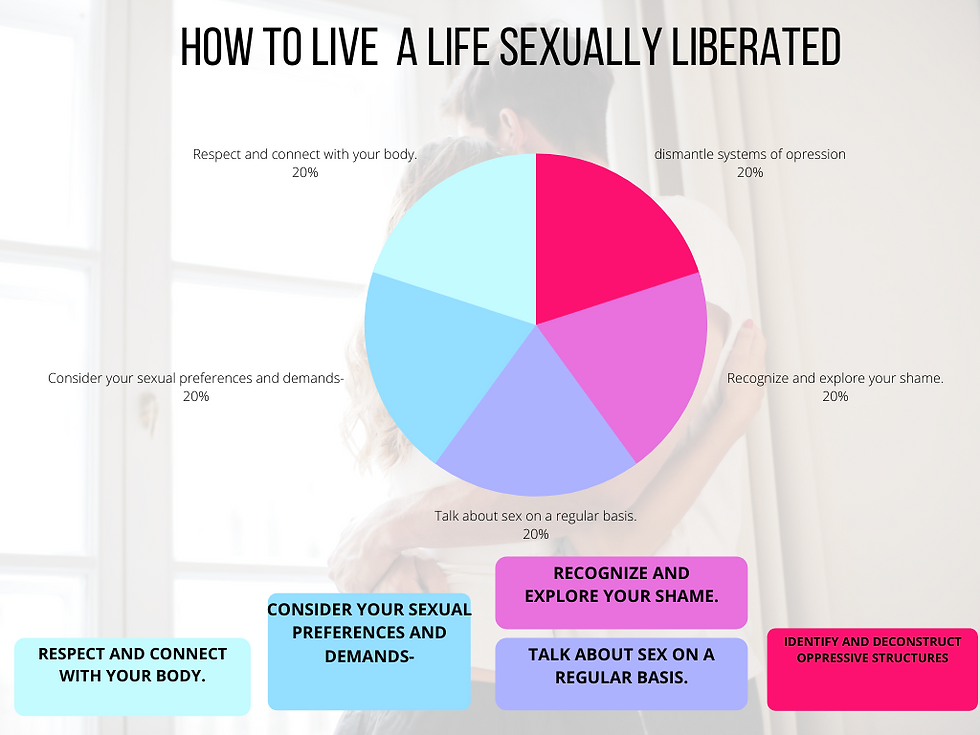
Reclaiming your pleasure in a sex negative world
A society that is sexually liberated is one that is healthy, connected, and empowered. When we are sexually liberated, we recognise that sex is about more than just the physical experience or orientation — it is about gender identity and social expectations as well. We shall understand as sexually liberated creatures that our sexual expression is how we choose to participate with life.
5 ways to achieve this:

1. Identify and deconstruct oppressive structures-
Recognising the systems implies that there is nothing wrong with humans having sexual experiences. These institutions, from patriarchy to white supremacy, strive to stifle sexual expression, notably through slut-shaming.
The belief that sex provides the fulfilment of (especially white) men's wants is ubiquitous and well-documented, and here is where patriarchy comes into play.
White supremacy is a topic that is rarely discussed. Rewire News Group investigates how Black people are frequently represented as asexual creatures in the media and have been historically suppressed for racial reasons, in order to "uplift white female sexuality as more modest and submissive."
One of the first steps toward welcoming truth and healing into our life is to name the structures that oppress us. If we don't get to the bottom of the problem, we won't be able to implement actionable mindfulness. Naming them helps us understand how systems operate in our lives, so we know where to begin disassembling.
2.Recognize and explore your shame-
Sexual expressiveness may be fraught with shame.
Annette Kämmer examines how guilt impacts our mental and emotional well-being in a Scientific American article.
Kämmer discovered that when we are "admonished" or stigmatised for breaching perceived "social standards" by others, such thoughts about ourselves can become internalised.
Shame is internal, and it is "painful and draining, impacting one's basic sense of self, and may provoke a self-defeating loop of negative emotion," according to Kämmer.
In a TEDx talk, Mandy Ronda examines sexual guilt and questions what it would mean, or even look like, to be shameless.
Exploring the guilt linked with sexual expression broadens our understanding of our liberty. On and off the mat, mindfulness encourages us to be genuine, to show up as ourselves. We learn to substitute compassion with guilt, and in doing so, we heal the scars of being embarrassed for our sexual expression.
3.Talk about sex on a regular basis-
Many of us may be apprehensive about discussing sex with friends or a significant other/partner. The taboo against discussing sex is founded in certain ideals associated with Christianity and Catholicism.
Sex education, which may frequently normalise how we experience sex and sexual expression, has been stifled by these religious institutions.
Sex education also provides us with a genuine grasp of how sex functions. Many people are uncomfortable discussing their sexual desires and interests because they lack this information (or not knowing them at all).
Sometimes practising practical mindfulness is just making space for these difficult talks. We can develop deeper ties with our friends and lovers when we begin to talk about sexual experiences and expressions.
Normalising these discussions can also assist others in overcoming their own guilt, as can expressing, "Me too." We assist not just our own emancipation but also the liberation of others when we choose to be vulnerable.
4.Consider your sexual preferences and demands-

It's all about getting to know ourselves when it comes to sexual liberation. We may be more receptive to exploring our wants and desires when we've deconstructed some of the guilt around sex.
What are the requirements for us to feel good about ourselves sexually? What are we willing to try? What is our sexual expression like for us?
Sexual emancipation does not imply sex without boundaries. It also does not imply that we become hypersexual. Sexual liberty, on the other hand, permits us to explore our sexual expression in a way that values our wants and desires, regardless of what they are.
Reflecting on our sexual wants and desires allows us to honour a part of ourselves that may have previously been embarrassed.
We may cure that part of ourselves by investigating our wants and desires. Furthermore, as we ponder on our requirements, we set limits for ourselves. Off the mat, mindfulness requires us to be present for ourselves, to stand firm in our convictions, and to treat our bodies and minds with care and compassion.
5.Respect and connect with your body-
Connecting with our bodies to learn what they appreciate and what makes them feel at ease is also part of sexual emancipation. We can learn more about our bodies' sexual wants and desires when we engage with them.
Most importantly, when we're in touch with our bodies, we know what feels good and what doesn't, and we can tell our partners what works and what doesn't by practising talking about sex. We have the ability to advocate for and honour our bodies.
We make room for deeper emancipation when we appreciate our bodies. We are no longer sexual for the wants of others; we are sexual for the worthiness, love, and desires of our own bodies.
In yoga and meditation, we honour the body when we practise mindfulness. On the mat, we sink into our bodies. Off the mat, though, we may connect with our body in the same way we do during a flow. We talk with our bodies as sexual beings, asking them questions and appreciating them when they say no, just as we do when we stretch deeply.
Bình luận